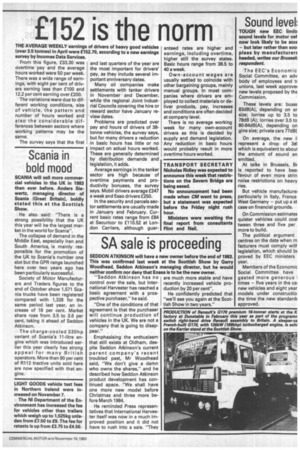f152 is the norm
Page 7

If you've noticed an error in this article please click here to report it so we can fix it.
THE AVERAGE WEEKLY earnings of drivers of heavy good vehicles (over 3.5 tonnes) in April were £152.70, according to a new earnings survey by Incomes Data Services.
From this figure, £33.30 was overtime pay and the average hours worked were 50 per week. There was a wide range of earnings, with eight per cent of drivers earning less than £100 and 12.2 per cent earning over £200.
The variations were due to different working conditions, size of vehicle, the pattern and number of hours worked and also the considerable differences between sectors where working patterns may be the same.
The survey says that the first and last quarters of the year are the most important for drivers' pay, as they include several important anniversary dates.
Many oil companies make settlements with tanker drivers in November and December, while the regional Joint Industrial Councils covering the hire or reward sector have January review dates.
Problems are predicted over pay and hours of drivers of 38tonne vehicles, the survey says, but for many drivers a reduction in basic hours has little or no impact on actual hours worked. These are generally determined by distribution demands and legislation, it adds.
Average earnings in the tanker sector are high because of overtime payments and productivity bonuses, the survey says. Mobil drivers average £247 a week and Esso drivers £250.
In the security and parcels sector settlements are usually made in January and February. Current basic rates range from £84 at Securicor to £110.52 at London Carriers, although guar anteed rates are higher and earnings, including overtime, higher still the survey states. Basic hours range from 38.5 to 40 a week.
Own-account wages are usually settled to coincide with other bargaining groups, mainly manual groups. In most companies where drivers are employed to collect materials or deliver products, pay, increases and conditions are often decided at company level.
There is no average working week for many own-account drivers as this is decided by supply and demand legislation. Any reduction in basic hours would probably result in more overtime hours worked.




























































































